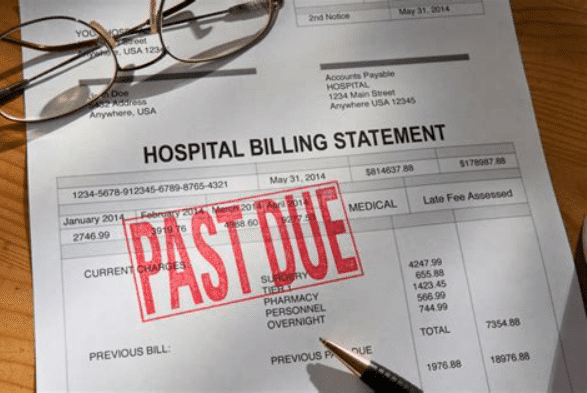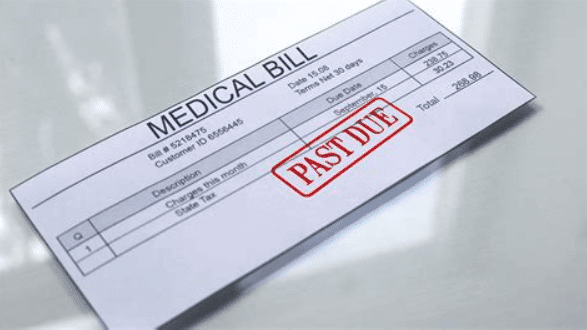The statute of limitations on medical debt is different in every state, but it’s usually around six years. Use ZumaZip.com to respond to a debt collection lawsuit and tell the court that your debt’s statute of limitations has expired.
The statute of limitations for a creditor to lawfully collect a debt varies from state to state. Medical debt is no different, and each state has a statute of limitations on medical debt too. This sets a time limit in which collectors can legally take someone to court over unpaid medical bills.
If the statute of limitations on your unpaid debt has passed, you should understand that the debt is still owed even if you can’t be sued for it. Another common misconception about statutes of limitations is that once this date has passed, the medical debt can no longer appear on your credit report. This is simply false. How long any item appears on your credit report has nothing to do with the statute of limitations for that particular debt.
If you’re being sued for a medical debt, draft your response in minutes with ZumaZip.com
Even if the statute of limitations on medical debt has passed, the creditor can attempt to sue you. Oftentimes, this is done because some consumers don’t know about their rights. If a medical debt creditor files suit after the statute has expired, they may be attempting to scare the consumer into paying the debt. If the consumer was unaware of the statute of limitations in their particular state, they might be frightened enough to start making payments.
Use our Statute of Limitations Calculator to find your limit
Lots of people wonder what the limit is on their medical debt, so we built out Statute of Limitations Calculator to make it easy to find when the statute of limitations expires on your debt. Again, once it is expired, a collector can’t sue you for it and you can bring it up as a defense if they do.
In all states, the statute of limitation differentiates between oral and written contracts. Medical debt is considered a written contract. The following table gives you the specific statute of limitations on unpaid medical bills or the medical debt expiration by state:
Here’s a table of Satutes of Limitations on medical debt
| Medical Debt Statute of Limitations by State | |
| State | Medical debt expiration timeline |
| Alabama | 6 years |
| Alaska | 6 years |
| Arizona | 5 years |
| Arkansas | 6 years |
| California | 4 years |
| Colorado | 6 years |
| Connecticut | 6 years |
| Delaware | 3 years |
| Florida | 5 years |
| Georgia | 6 years |
| Hawaii | 6 years |
| Idaho | 5 years |
| Illinois | 10 years |
| Indiana | 10 years |
| Iowa | 10 years |
| Kansas | 5 years |
| Kentucky | 10 years |
| Louisiana | 10 years |
| Maine | 6 years |
| Maryland | 3 years |
| Massachusetts | 6 years |
| Michigan | 6 years |
| Minnesota | 6 years |
| Mississippi | 3 years |
| Missouri | 10 years |
| Montana | 8 years |
| Nebraska | 5 years |
| Nevada | 6 years |
| New Hampshire | 3 years |
| New Jersey | 6 years |
| New Mexico | 6 years |
| New York | 6 years |
| North Carolina | 3 years |
| North Dakota | 6 years |
| Ohio | 6 years |
| Oklahoma | 5 years |
| Oregon | 6 years |
| Pennsylvania | 4 years |
| Rhode Island | 10 years |
| South Carolina | 3 years |
| South Dakota | 6 years |
| Tennessee | 6 years |
| Texas | 4 years |
| Utah | 6 years |
| Vermont | 6 years |
| Virginia | 5 years |
| Virginia | 5 years |
| Washington | 6 years |
| West Virginia | 10 years |
| Wisconsin | 6 years |
| Wyoming | 10 years |
Now, let’s look at an example.
Example: Cate slipped on an icy sidewalk and tore ligaments in her knee in Dallas, Texas. Cate needed surgery to repair the damage and allow her knee to heal properly. That statute of limitations for billing patients in Texas is four years. Cate was unable to pay and defaulted on the debt. Cate was contacted repeatedly by debt collectors over the four years. After four years, a debt collection company threatened to file a lawsuit. After doing some research, Cate ignored the threat because she knew that the statute of limitations had expired and she was not in danger of being sued. When the debt collection company took her to court, Cate used ZumaZip to draft and file her Answer. In her Answer, she included the affirmative defense that the statute of limitations had expired, and the court dismissed her case.
What you need to know about the statute of limitations
Now that you have this handy dandy reference guide detailing the time a creditor can legally take action on medical debt, there are a few other things you should be aware of regarding the statute of limitations.
It’s one thing to know that in your state, the creditor has six years to legally take action on your medical debt. It is another thing to know exactly when the clock starts. Every communication and/or payment made by the consumer to the creditor regarding the specific medical debt in question restarts the clock on the statute of limitations.
If you were unable to make a payment and were avoiding all communication attempts made by the creditor, you must know that if you were to accept a call and acknowledge the debt to the debt collector or respond to a letter from the creditor stating that you owe the debt, the clock restarts in most states. The same situation applies if you were to make a payment on the debt.
If you didn’t make the last payment and have not communicated in any way with the creditor, the clock begins from the date you missed the last payment. Depending on the amount of debt, keep in mind that the creditor can take legal action against you for the medical debt during the period within the statute of limitations.
The FDCPA can protect you
As a consumer, you have rights under The Fair Debt Collection and Practices Act (FDCPA) that protect you against unlawful medical debt collection practices. The FDCPA governs the actions collection agencies and law firms can take in attempting to collect a debt. There are some sketchy agencies or law firms that may break these laws in their attempt to collect the debt.
Here are some example of ways debt collectors violate the FDCPA:
- Calling to discuss a debt before 8 a.m. or after 9 p.m.
- Calling your family members, workmates, or friends and asking about your debt.
- Refusing to respond to your Debt Validation Letter.
- Using threatening, vulgar, or derogatory language to get you to pay a debt.
- Lying that they will confiscate your driving license or other documents if you do not pay.
- Pretending to be a police officer or judge.
- Attempting to collect a debt that they know doesn’t belong to you.
- Suing you for a debt that has passed the statute of limitations.
It is important for all consumers to arm themselves with the knowledge and understanding of these basic consumer rights. Knowing the statute of limitations on medical debt bills is a step in this direction.
If a debt collection agency or law firm has violated these laws, report them to The Fair Trade Commission (FTC) online platform, submit a complaint in the Consumer Financial Protection Bureau (CFPB) and post a review on the collection agency’s Better Business Bureau (BBB) profile. These platforms will follow up on the complaint and take legal action against the agency.
Below is another example.
Example: Casey lived in Georgia and had a medical debt of $1800 that was over six years old. He totally forgot about the debt until he received multiple calls a day from Nationwide Collection Agency asking him to pay the debt or they would take legal action. He ignored their attempts to collect until he received a lawsuit letter from them. Casey knew the debt had exceeded the statute of limitations on unpaid medical bills and responded confidently with ZumaZip’s Answer. In the Answer document, he entered an affirmative defense stating that the debt had passed the expiration date according to Georgia’s laws. Nationwide Collection Agency dismissed the case and did not attempt to sue him again.
Make the right affirmative defense the right way with ZumaZip.com.
Creditors view medical debt differently
Your consumer rights extend to your credit reports, meaning that creditors should be careful about the debt they include in your credit report and when they add it. In the past, medical debts were viewed to have the same importance as a mortgage or car loan. Over the last few years, Credit Bureaus have taken the position that consumers incur medical debt not of their choice but out of their control. As a result, medical debt carries less weight than traditional credit extended to consumers.
For instance, on March 22, 2022, Equifax, Experian, and TransUnion announced changes in reporting medical debt that will erase 70% of these debts on consumers’ credit reports. These changes, which took effect in July of 2022, include:
- The period before entering a medical debt on your credit report is now one year, up from six months.
- A paid medical debt will no longer be added to your credit report.
- The three credit bureaus will not include medical debt under $500 on your credit report in the first half of 2023.
Even if your debt is past the statute of limitations, and the creditor is barred from taking any legal actions, the debt is still owed. It is more than likely the creditor will continue all collection efforts, but luckily, they cannot sue you for the debt.
To accurately find out what the exact status of your medical debt is regarding your specific state’s statute of limitations on medical bills can be difficult at times. However, there are several ways for you to find this information:
- Contact your state’s attorney general office. They can provide you with information pertinent to your specific state.
- Contact a local legal aid office, but know that their resources are limited.
- Hire an attorney to assist you with this matter. Lawyers can prove to be very costly, so beware.
- Use ZumaZip.com to represent yourself in a lawsuit and learn more about debt collection practices and laws.
What is ZumaZip?
ZumaZip is a convenient solution designed to streamline your response to a debt collection lawsuit. Here’s a breakdown of what you can expect when you use ZumaZip:
Firstly, you’ll access our user-friendly web application, which guides you through the process step by step. You’ll be prompted to answer a series of questions related to your specific situation. Once you’ve completed the questionnaire, you have the option to either print out the finalized forms and mail them to the appropriate courts yourself, or you can opt to utilize ZumaZip’s services to file them on your behalf. Additionally, if you choose this option, an attorney will review your document for added peace of mind.
If you’re seeking guidance on how to effectively respond to a debt collection lawsuit, ZumaZip can provide the assistance you need. Feel free to explore our FAQs for more information on what ZumaZip has to offer.
What if I haven’t been sued yet?
If you’ve only received a collections notice, but not a lawsuit, the best way to respond is with a Debt Validation Letter. When a debt collector contacts you in any way, whether it’s by phone or mail, you can respond by formally requesting a debt validation with a Debt Validation Letter . This letter notifies the collector that you dispute the debt and forces them to provide proof you owe the debt. They can’t call you or continue collecting until they provide validation of the debt. This flowchart shows how you can use a Debt Validation Letter to win.
Get started with a Debt Validation Letter here.
How to Answer a Summons for debt collection in all 50 states
Here’s a list of guides on how to respond to a debt collection lawsuit in each state:
- Alabama
- Alaska
- Arizona
- Arkansas
- California
- Colorado
- Connecticut
- Delaware
- Florida
- Georgia
- Hawaii
- Idaho
- Illinois
- Indiana
- Iowa
- Kansas
- Kentucky
- Louisiana
- Maine
- Maryland
- Massachusetts
- Michigan
- Minnesota
- Mississippi
- Missouri
- Montana
- Nebraska
- Nevada
- New Hampshire
- New Jersey
- New Mexico
- New York
- North Carolina
- North Dakota
- Ohio
- Oklahoma
- Oregon
- Pennsylvania
- Rhode Island
- South Carolina
- South Dakota
- Tennessee
- Texas
- Utah
- Vermont; Vermont (Small Claims court)
- Virginia
- Washington
- West Virginia
- Wisconsin
- Wyoming
Guides on how to beat every debt collector
Hey there! Facing off against a debt collector can feel like a daunting challenge, but fear not! We’re here to help you navigate through it all with our handy guides designed to assist you in beating every debt collector you encounter. Whether you’re facing a new lawsuit or dealing with a persistent collector, we’ve got your back. Stay positive, stay informed, and let’s tackle this together!
- Absolute Resolutions Investments LLC
- Accredited Collection Services
- Alliance One
- Amcol Clmbia
- American Recovery Service
- Asset Acceptance LLC
- Asset Recovery Solutions
- Associated Credit Services
- Autovest LLC
- Cach LLC
- Cavalry SPV I LLC
- Cerastes LLC
- Colinfobur
- Covington Credit
- Crown Asset Management
- CTC Debt Collector
- Cypress Financial Recoveries
- Delanor Kemper & Associates
- Eagle Loan of Ohio
- Educap
- Estate Information Services
- FIA Card Services
- Forster & Garbus
- Freshview Solutions
- Fulton Friedman & Gullace LLP
- Harvest Credit Management
- Howard Lee Schiff
- Hudson & Keyse LLC
- Integras Capital Recovery LLC
- Javitch Block
- Jefferson Capital Systems LLC
- LVNV Funding
- Mannbracken
- Mariner Finance
- Medicredit
- Michael J Adams PC
- Michael J Scott
- Midland Funding LLC
- Mullooly, Jeffrey, Rooney & Flynn
- Mountain Land Collections
- MRS Associates
- National Collegiate Trust
- Nationstar Foreclosure
- Northstar Capital Acquisition
- NCEP LLC
- NRC Collection Agency
- OneMain Financial
- Palisades Collection LLC
- Pallida LLC
- Paragon Revenue Group
- Pinnacle Collections Agency
- PMAB LLC
- Portfolio Recovery Associates
- Provest Law
- PYOD LLC
- Reunion Student Loan Finance Corporation
- Revenue Group
- Regents and Associates
- RSIEH
- Salander Enterprises LLC
- Second Round Sub LLC
- Security Credit Services
- Sherman Financial Group
- Suttell and Hammer
- T-Mobile
- Transworld Systems
- Tulsa Teachers Credit Union
- UCB Collection
- Velo Law Office
- Velocity Investments
- Waypoint Resource Group
- Weinberg and Associates
- Wolpoff & Abramson
Settle your medical debt
Having a health challenge is stressful, but dealing medical debt on top of it is overwhelming. Here are some resources on how to manage medical debt.
- Am I Responsible for My Spouse’s Medical Debt?
- Do I Need a Lawyer for Medical Bills?
- Do I Need a Lawyer to Fight Medical Bill Debt?
- Does Bankruptcy Clear Medical Debt?
- How Much Do Collection Agencies Pay for Medical Debt?
- How to Find Medical Debt Forgiveness Programs
- Is There a Statute of Limitations on Medical Bills?
- Medical Debt Statute of Limitations by State
- Summoned to Court for Medical Bills — What Do I Do?
- Summoned to Court for Medical Bills? What to Do Next
Stop calls from Debt Collectors
Do you keep getting calls from an unknown number, only to realize that it’s a debt collector on the other line? If you’ve been called by any of the following numbers, chances are you have collectors coming after you, and we’ll tell you how to stop them.































